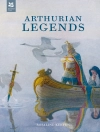Arabian Nights or One Thousand and One Nights, as presented by Andrew Lang, alongside Robert Louis Stevenson’s New Arabian Nights, invites readers into a rich and diverse tapestry of storytelling that spans cultures and centuries. This anthology explores universal themes of adventure, justice, and moral quandaries through an array of narrative styles, ranging from folklore to early modern storytelling. Lang’s curation of the mystical tales from the Middle East alongside Stevenson’s sophisticated reinventions encapsulates the enduring allure of storytelling that transcends geographical and temporal boundaries. **Ali Baba**, **Sinbad the Sailor**, and **The Bottle Imp** are just a few of the standout narratives that exemplify the collection’s diversity and depth. Andrew Lang, renowned for his anthropological prowess, brings academic rigor and a keen appreciation for cultural legacy to his edits of the Arabian Nights, while Stevenson’s contributions reflect a Victorian fascination with exotic adventures and moral complexities. Through the blend of Lang’s documentary approach and Stevenson’s narrative finesse, readers are exposed to key cultural and literary movements from pre-modern Arabic lore to Victorian detective fiction, reflecting a shared human curiosity and imagination that spans epochs. The result is a rich dialogue of storytelling traditions that invite reflection and intellectual engagement. Readers will find this anthology an unparalleled opportunity to engage with multifaceted tales that traverse the spectrum of human experience. Ideal for scholars and avid readers alike, it serves as an educational tool and a source of pleasure in examining cross-cultural narratives that stand the test of time. With each tale offering unique insights, it profoundly enriches the understanding of narrative art, facilitating a nuanced dialogue between these cultural titans. Indulge in this collection to explore the multiplicity of voices that continue to captivate and educate.
A propos de l’auteur
Robert Louis Stevenson (1850-1894) was a Scottish novelist, poet, essayist, and travel writer, whose literary contributions have become classics of English literature. Stevenson, scion of lighthouse-builders, battled with lifelong ill health, which compelled him to live much of his life in more amenable climates; this experience shaped much of his writing. Noted for his inventive and vivid storytelling, he became most famous for works such as ‘Treasure Island’ (1883), ‘The Strange Case of Dr Jekyll and Mr Hyde’ (1886), and ‘Kidnapped’ (1886). Stevenson’s foray into the exotic and suspenseful is also visible in ‘New Arabian Nights’ (1882), a collection that harnesses the mystical allure of the East and showcases his skill in ironic and fantastic tales that speak to universal human experiences. These narratives are part of his diverse opus which combines adventure with psychological depth, reflecting Stevenson’s avant-garde approach to fiction and his ability to traverse genres. While Stevenson did not pen the classic ‘Arabian Nights’ or ‘One Thousand and One Nights’—often associated with the name Andrew Lang—he undeniably contributed to the western literary canon with his unique pastiches and genres such as the short story cycle exemplified in ‘New Arabian Nights.’ Stevenson’s literary style, often categorized under the movement of romanticism, is marked by his lucid, descriptive language, and his innate gift for engaging the reader with characters that are enduringly complex.












